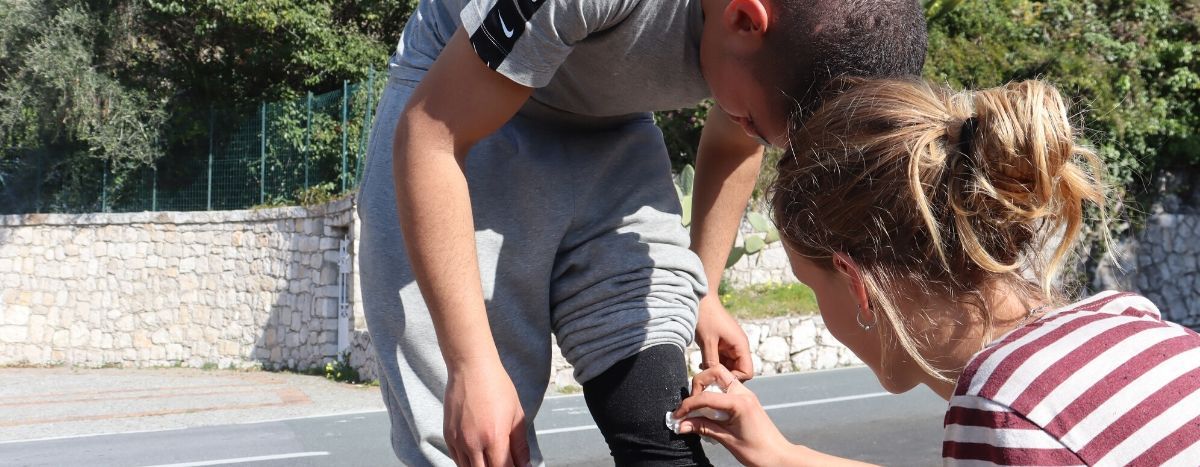
Migrant crisis: Liberty, equality and offence of solidarity
Published on
Translation by:
Arwen DeweyIllegal deprivation of liberty, no access to even the most basic health care and falsification of identity papers by the police - migrants continue to see their fundamental rights violated at the Franco-Italian border despite alarms raised by solidarity associations. The third and final instalment in our investigation: Extreme Borders.
Travelers step down onto the platform and head for the exit. In front of the train station in Nice, five policemen surround two teenagers who don't speak French. The agents search the boys' pockets, but find nothing. After five minutes, one of the boys is allowed to go, with a "get lost, you don't belong here!" The boy heads back towards the station, phone held tightly to his ear. The second boy is still surrounded by police officers who are demanding his identity papers and to remove his shoes. He does as he is told, until he is interrupted by a man, around 50 years old, who arrives on an electric scooter. The man speaks to the police for a few seconds, then leaves, taking the two boys with him. "They thought I had drugs hidden in my shoes," explains Mahdi, one of the two boys stopped. The man who came to help them is Joël Bergelin. He's a volunteer with Tous Citoyens ("All Citizens"), a local organisation that safeguards the rights of unaccompanied minors in Nice.
"Here, the police stop people based on what they look like, and lots of children are mistaken for adults," says Joël, gesturing towards the two teens, who are in fact only 15 years old. This kind of police behaviour towards migrants happens all the time in the Alpes-Maritimes region, South of France. On March 3rd, the Administrative Tribunal of Nice nailed the Alpes-Maritimes Prefecture on the right to asylum, with three rulings suspending the deportation of migrants to Italy from Menton, a town on the French Riviera. The rulings concern irregularities in the denial of entry, particularly in the case of an unaccompanied minor from Sudan who was interrogated in English although he spoke only Arabic.
"The association uncovered another type of violation of the rights of foreign minors: the falsification of their birth dates by police in order to pass them off as adults and send them back to Italy."
ANAFE (The National Association of Border Assistance for Foreigners) has also denounced the "illegal practices of the French administration" towards migrants who attempt to cross the border. In a report based on observations made between 2017 and 2018, the association uncovered another type of violation of the rights of foreign minors: the falsification of their birth dates by police in order to pass them off as adults and send them back to Italy.
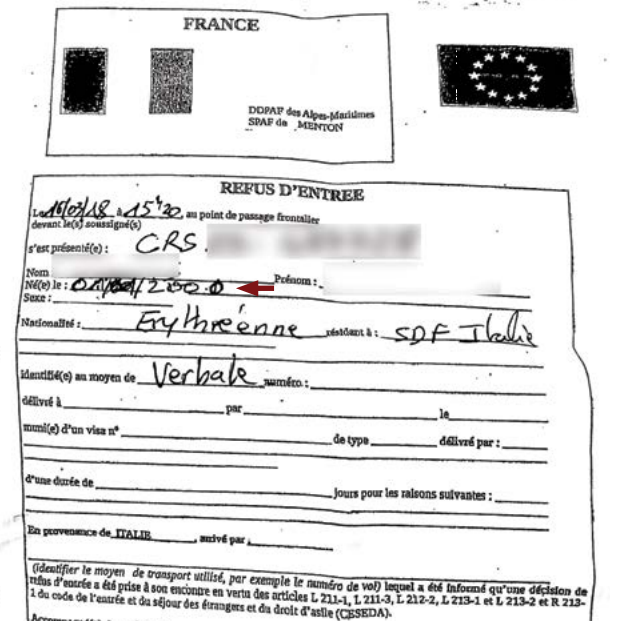
Through its network of volunteers, Joël's association houses unaccompanied minors and helps them exercise their right to be heard by the children's judge at the Tribunal of Nice. “We have birth certificates shipped from their countries through DHL so they can't be contested. Then our lawyer, Mireille Damiano, presents them to the judges to prove that they are minors." According to Joël, many young migrants who have tried to cross the border later experience severe health problems. "Recently, a seriously ill child was put back out in the street when he should have been rushed to the hospital. Without us, the kid would have died on the beach," he says.

Just a few meters from the train station, the charity Secours Catholique opens its doors and welcomes new arrivals, who are offered toast with jam. Every day, around 100 homeless people go there to find help. These days, the group includes migrants who have crossed the Franco-Italian border after travelling across Libya. "They are the ones in the most precarious situations," says Jean-Pierre Blanc, director of the Health Division of Secours Catholique. "Many of them sleep on the streets, while they have respiratory and somatic issues as well as mental health problems." In other words, they suffer from psychological trauma, often due to their involuntary displacement and the long journeys migrants are confronted with. "We welcome people who have been held in various prisons after crossing Africa and the Mediterranean Sea. They are wounded, both physically and psychologically," says Patrick Martinez, member of the Mobile Precarity Psychiatric Team (EMPP) at the Centre Hospitalier Universitaire in Nice.
Severe Physical and Psychological Health Problems
30 kilometres from Nice, Omar is leaving the Saint Ludovic border post, situated between Menton and Vintimille. He spent the night there with around 15 people in an Algeco, a 15 m² container adjoining the Border Police (PAF) facility. The young man, who injured his knee the day before while trying to avoid the police, is limping. "I asked them for the simplest of things, just a bandage and a blanket for the night. They gave me nothing," says Omar. Luckily for him, his guardian angel was only about 10 meters from the border, on the Italian side. Adèle, aged 22, is a member of Kesha Niya, a collective that has maintained its presence at the border for over a year to denounce the actions of the French border police.
"Almost everything happening here on these premises is illegal. These containers have no legal standing. It isn't a detention zone or a border police prison cell," says the young woman, referring to the Algeco. According to the Tribunal of Nice, the container is a transit space designed to shelter migrants for four hours or less. But the Italian police at the border post don't take charge of people turned away between 7:00 p.m. and 9:00 a.m. This means that migrants like Omar have to spend the night inside these prefabs, meant for migrants who are "in the process of non-admission." In other words, they are considered as never having entered France and returned directly to the Italian authorities.
"There's no access to medical care, just a metal bench that isn't wide enough to lie down on," states Omar, pulling up his pant leg to show his wound. It's infected and stuck to the fabric of his pants, which the young man has been wearing since the night he spent in the prefab. Adèle, who is a volunteer, grabs her first aid kit and takes out antiseptic and a bandage. "We meet a lot of sick people who haven't been able to take their medication. The police response can sometimes be very violent, both verbally and physically," she says.
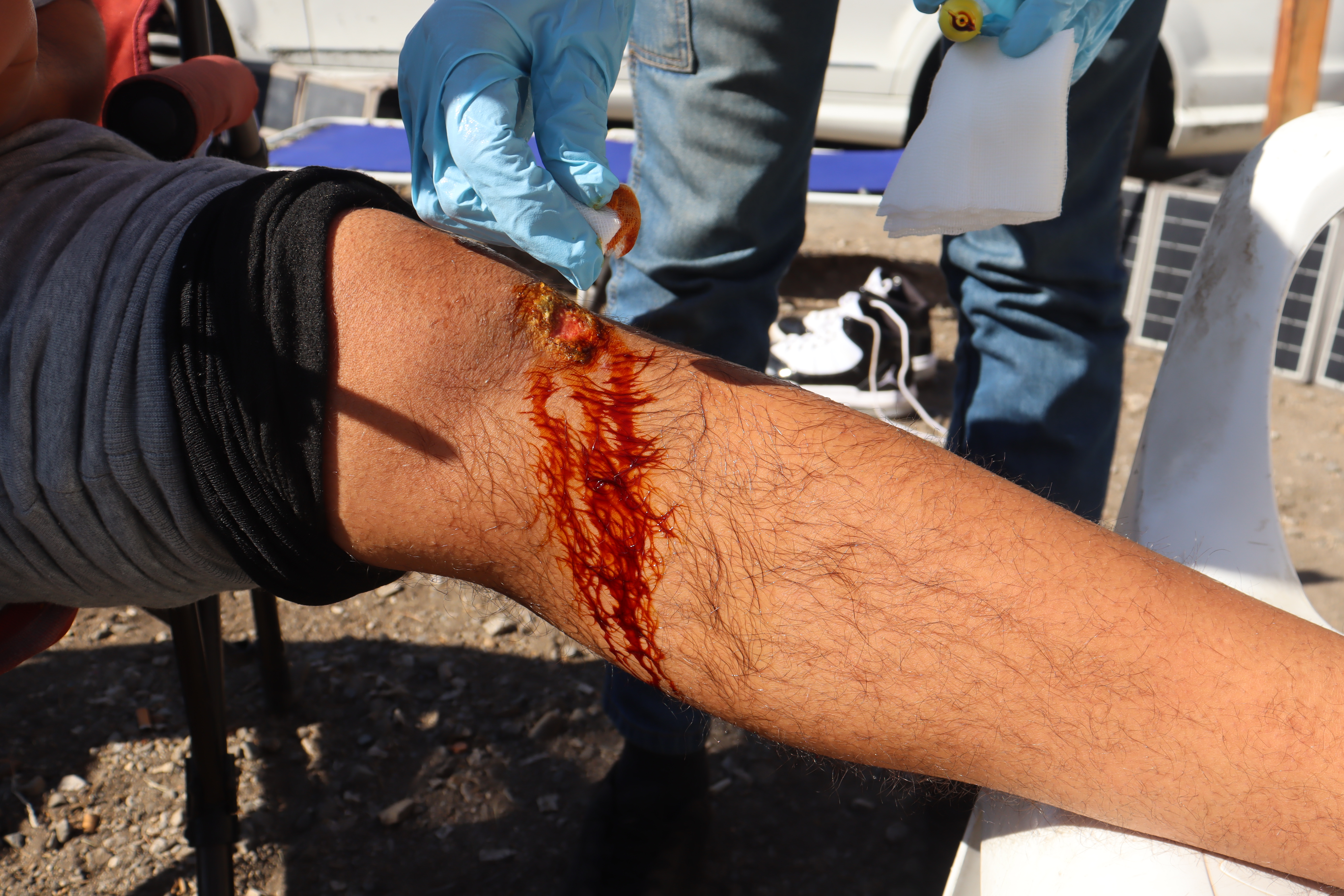
The mayor of Vintimille, the first Italian town past the border, says that the Kesha Niya collective has no reason to exist, since humanitarian aid is already provided by the Red Cross camp in Vintimille. The camp has room for up to 500 people. However, according to Kesha Niya, the numbers of migrants rejected in recent months have been between 500 and 2,000 per month. "A Kesha Niya member [Adèle] came to see me here in my office. It's not right to have a group of young people 200 metres from the border, giving food and drink to these people who claim to have been mistreated," says mayor Gaetano Scullino. "We cannot accept this situation. Doing so would mean that Vintimille isn't managing the issue properly."
Find out more: The Italian-French border: Land of fake news from the far-right
Cafébabel obtained a vidéo filmed by a young migrant last November in the interior courtyard of the Algecos. The cameraman denounces the police's use of pepper spray. It's a method that's used, according to Adèle, when the police decide to bring a few people out of the container. "The first to arrive aren't always the first to leave. The police choose five people, but everyone wants out, so they all push a little towards the exit. We've had several dozens of people arrive in tears because of the spray. The police don't even try to justify it," says Adèle, setting up a selection of food a few dozen feet from the border.
The young woman calls it arbitrary detention, and says that around 20 associations, including Roya Citoyenne and Kesha Niya, have informed special UN reporter Felipe Gonzales Morales. Last November, MEP Manon Aubry visited the border to see the premises of the border police. French elected officials are allowed to visit without advance notice according to Article 719 of the Criminal Procedure Code. But the border police refused to grant her access to the Algecos. They were within their rights, according to an internal memorandum written by the "Central Directorate of Border Police, which states that the posts at Montgenèvre and Menton aren't places of deprivation of liberty, but places of shelter," according to the MEP. Adèle explains that this internal memorandum, written in 2018, states that "no one can see, and defines the Algecos as places of shelter from the dangers of the street, even though there's no food or doctors."
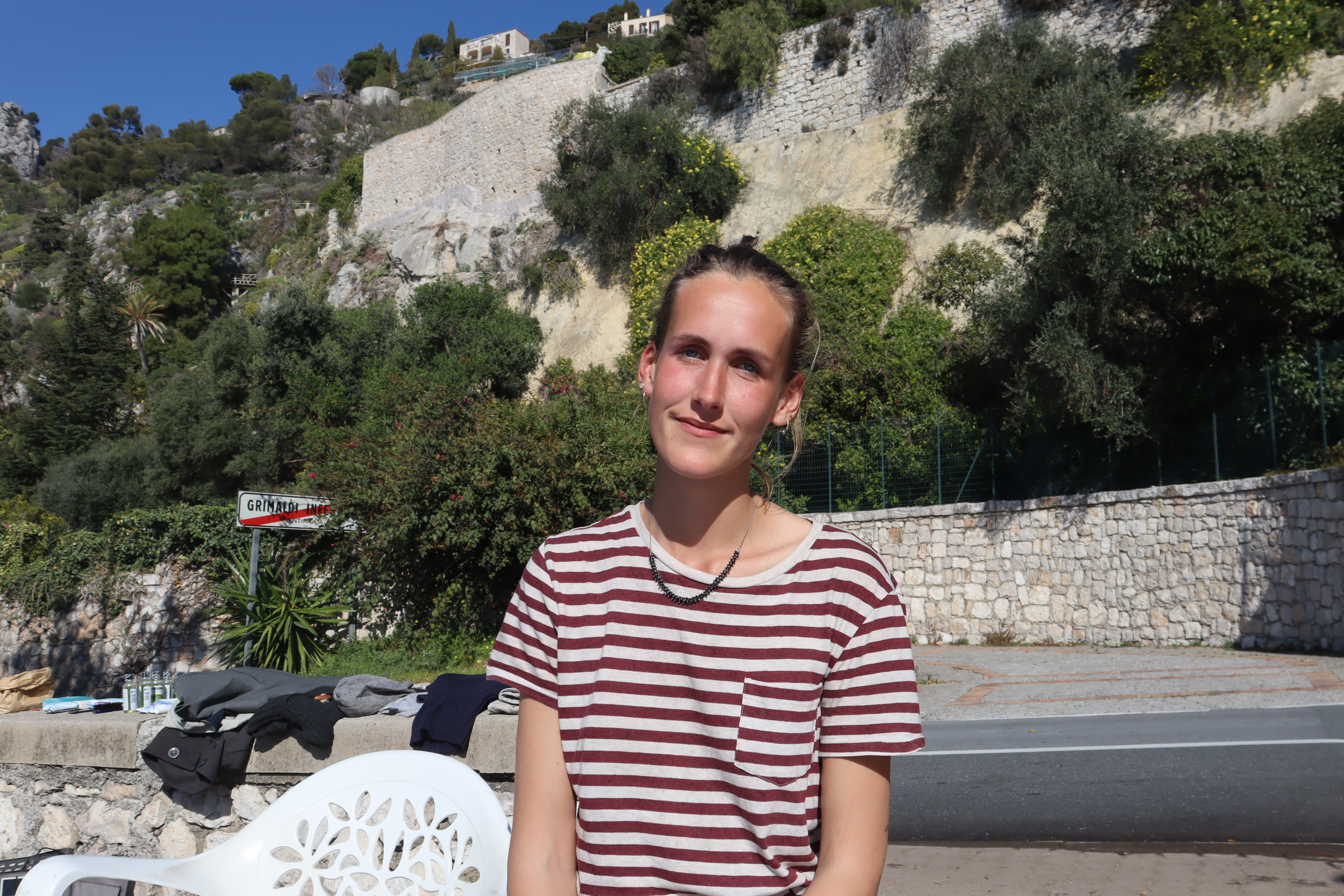
Labour Value
Six refugees, two supervisors and civic engagement. Cédric Herrou launched the first Emmaus-backed farming community on his farm in the Vallée de la Roya region. Today he works with refugees and the homeless. Using his OACAS (Community Welcome and Solidarity Business Organization) status, the farmer welcomes people who are living in extremely unstable conditions and gives them an opportunity to work with the goal of making the community self-sustaining. "We mainly grow vegetables and sell them," he explains. According to Cédric, giving work to refugees has helped decrease tensions on the subject in the valley. "Farming and growing vegetables gives you value here. It's acknowledgement through work."
That’s a relief for Cédric, who has become a media symbol for the valley's tensions surrounding the migrant crisis. Before starting Emmaus Roya, he was often a target in the valley. "In the beginning, I was afraid of physical attacks. Some people see me as a person to take down. For a long time, I slept with a gun under my bed." Cédric is currently in an appeals process following the court of cassation's repeal of his four-month suspended prison sentence in 2017 for "aiding in the entry, circulation and illegal residence of foreigners in France." It's what activists call an "offence of solidarity."
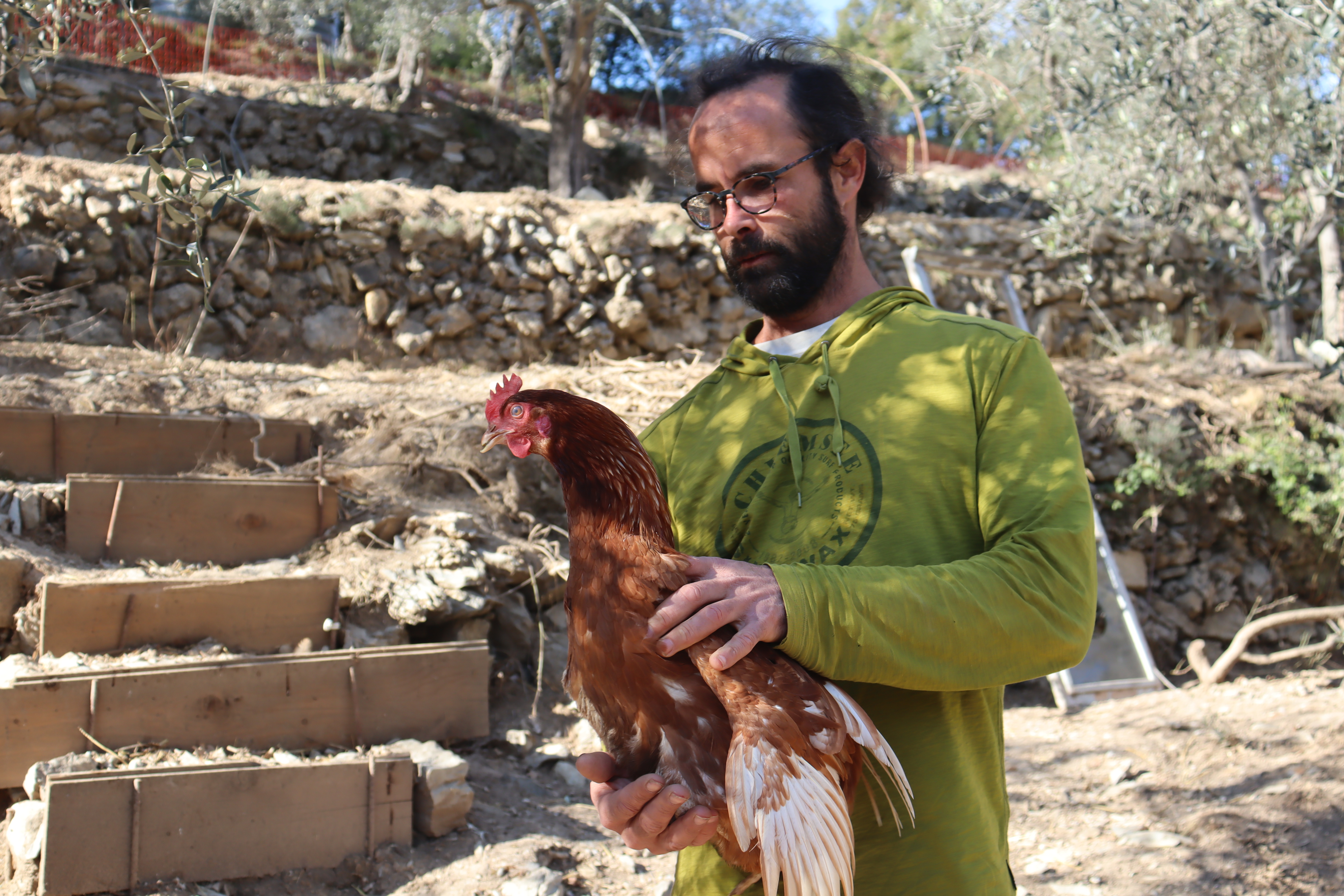
The coffee is ready. Teresa Maffeis lights a cigarette and sits down on the couch. Her colourful apartment looks just like its owner, who is always dressed in green. Teresa has been an important figure in activist circles in Nice for many years. She created the ADN (Association for Democracy in Nice) to fight the far right in the Alpes-Maritimes. But since 2015, her priority has been helping the migrants stuck at the Franco-Italian border. She shares Cédric Herrou's commitment, but her vision is different. "In my opinion, wanting to represent migrants all by yourself doesn't help them. And it gives ammunition to the far right," she adds, although she admits that at the time media attention needed to be drawn to the issue. She is both French and Italian, and uses her network in Italy to get help to migrants. "I work with Italian activists a lot, especially as a witness in their trials," she says, smiling. "When minors cross the border, the activists call me and I go to the train station in Nice to pick the kids up." Then she takes them to children's centres. "Once they've arrived in France, minors don't need to claim the right to asylum anymore, they are entitled to be protected as children," adds Teresa, who has adopted Nice as her home.
Cradle of the "Hard" Right
Ever since the candidacy of Jean-Marie Le Pen in the 1992 regional elections in the Provence Alpes Côte-d’Azur (PACA) region, Teresa, who is in her seventies, has been deeply concerned about the far right taking root in the Alpes Maritimes. The second round of municipal elections in Nice is between the outgoing mayor, Christian Estrosi, and a Rassemblement National candidate who belongs to the Bloc Identitaire nationalist movement, Philippe Vardon. "I'm afraid Vardon will be elected to the city council. The nationalists have this plan to join all the city councils." She adds, "I've known Vardon since he was a kid, he's always been a fascist." Cédric Herrou says he feels optimistic about the political future of Vallée de la Roya. However, the municipality of Breil-sur-Roya, where he lives, just recorded a crushing victory for the right in the first round of municipal elections against the outgoing, left-leaning mayor. Sébastien Olharan, with the support of National Assembly member Eric Ciotti, was chosen to breathe new life into Breil, his municipality. He feels that Breil has "degraded in the past few years, with the migrant crisis at the heart of the debate." Will the electoral victory of a young candidate who has often shown himself to be hostile towards welcoming migrants pose a threat to the solidarity of certain Roya locals? Cédric says there's no cause for alarm. "In the past few years, Vallée de la Roya has become known for its growing solidarity with migrants. We have already won."
This article is the third instalment in our series, "Extreme Borders". Journalist Safouane Abdessalem has used his investigations at the Franco-Italian border to attempt to discover the far right's electoral strategies for the 2020 municipal elections. Connections that they may or may not admit to with small nationalist groups, publication of false information about the migrant question, proceedings against local solidarity associations... How far will the far right go to sway voters? Find out how the investigation develops in our coming instalments.
This project has been carried out with the support of the Ecole des Hautes Etudes en Sciences Sociales. It has been coordinated by the OpenEdition Centre and financed by the French Ministry of Culture's Fonds de Soutien à l'Emergence et à l'Innovation dans la Presse [Fund to Support Renewal and Innovation in the Press].
Cover photo: © Safouane Abdessalem
Translated from Crise migratoire : liberté, égalité, délit de solidarité



